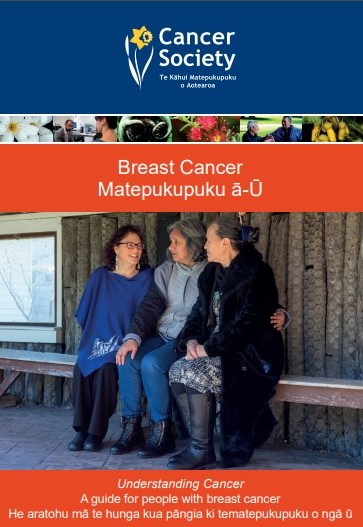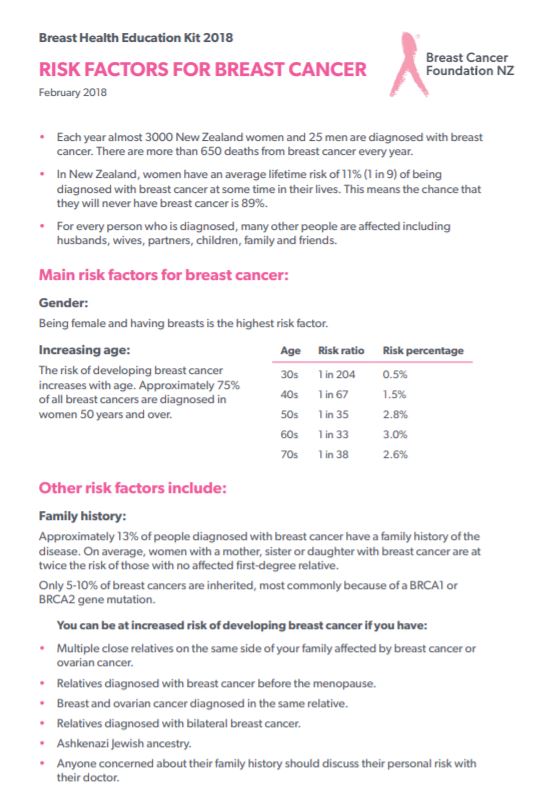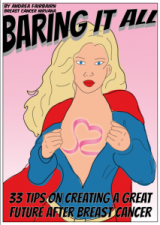You can now add Healthify as a preferred source on Google. Click here to see us when you search Google.
Breast cancer | Mate pukupuku ūtaetae
Key points about breast cancer
- Breast cancer can occur at any age but is most common in women over 40 years of age. Your risk is greater if you have a family history of breast cancer.
- Treatment is usually more successful if breast cancer is found at an early stage.
- For this reason, women are offered a free mammogram every 2 years from 45 to 69 years of age and, if they're eligible, up to the age of 74.
- By the time you can feel a breast cancer, it's about the size of a cherry or walnut. Mammograms can pick up breast cancers that are as small as a grain of rice.
- If you find a breast lump at any time, see your healthcare provider to have it checked. Don't wait for your mammogram.

Breast cancer (mate pukupuku ūtaetae) is a harmful growth that starts in your breast tissue. It is the most common cancer among New Zealand women, affecting 1 in 9 women over their lifetime.
On average, 9 people in Aotearoa New Zealand, will hear the news today that they have breast cancer.
Breastscreen Aotearoa(external link) is a national screening programme providing free mammograms to women aged 45 to 69 years, every 2 years. This age range is being extended and, if you qualify, screening will be every 2 years up to 74 years of age. This service helps to catch breast cancer early and save lives. Read more about breast screening and about the extension of the screening programme and eligibility(external link).
Men can develop breast cancer, though this is rarer being only 1% of all breast cancers.
Cancer is caused when some of the cells in your body start to grow out of control. These cells keep multiplying and form a lump called a tumour.
Some breast cancers grow very slowly, while others grow much faster. Breast cancer can spread to the lymph glands and to other parts of the body, such as the bones and liver.
The causes of breast cancer are not clear, but many risk factors are known. The main factors that influence your risk include being female and getting older. Most breast cancers are found in those who are 40 years old or older. Read more about the risk factors for breast cancer.
Breasts undergo changes throughout life. In particular, breasts may become sore, lumpy or swollen during the menstrual cycle. Not all breast lumps are caused by cancer, but some breast changes that may be early signs of cancer include:
- a new lump in your breast or armpit
- changes to your breast shape or size
- changes to the skin of your breast such as dimpling, puckering or thickening
- changes to your nipple such as turning inwards, ulcers or a new itch
- nipple discharge or bleeding
- redness that doesn't go away
- pain in your breast that doesn't go away.
If you have any of these changes, you don’t necessarily have breast cancer, but you should see your healthcare provider to get your breasts checked.
Most breast cancers begin in the milk ducts (ductal cancers), while a small number start in the milk sacs or lobules (lobular cancers). Within these 2 groups there are different subtypes of breast cancer.
The causes of breast cancer are not clear, but many risk factors are known. The following factors increase your chance of getting breast cancer:
- Being female.
- Getting older.
- Having previously had breast cancer.
- Having an increased number of abnormal cells in the milk ducts. This can be seen in a breast biopsy.
- Having dense breast tissue.
- Starting menstrual periods when you were younger than 12 years of age.
- Being 30 years of age or older when your first child was born.
- Not having given birth to any children.
- Reaching menopause at a later age (55 years of age or older).
- Having a family history of breast cancer – this risk can be mild, moderate or high, and depends on:
- the number of relatives affected
- whether they are first or second-degree relatives (first-degree are sisters, brothers and parents), and
- the age of the relative(s) when their breast cancer was found.
- Inheriting 1 of the abnormal genes associated with breast cancer, such as BRCA mutations.
Even with a high risk, most people won't develop breast cancer.
Family history and genetic risk factors
About 1 in 20 breast cancers is caused by a faulty breast cancer gene. If yours was caused by such a gene, your healthcare provider can help you decide whether genetic testing would be helpful for your wider family. Find out more about the BRCA gene. Note that this is not the only abnormal gene involved in breast cancer.
Most women who develop breast cancer have no family history of the disease, so your best protection involves being aware of what to watch out for and having regular screening mammograms.
Read more about breast cancer screening and mammograms.
You can't change your genes, but you can reduce your chance of getting breast cancer by doing the following things:
- Exercise regularly.
- Limit alcohol.
- Talk to your healthcare provider about contraception or menopause treatments that are best for minimising your breast cancer risk.
- Be aware of how your breasts usually look and feel – if you notice any changes see your healthcare provider.
- Make use of the free beast screening programme in Aotearoa New Zealand to find cancer early so it can be treated and you can have the best chance of a cure.
- Ask your healthcare provider whether you need extra screening. This will depend on how many of your relatives have (or had) breast cancer and how old they were when they got it.
Being overweight increases risk, and reducing weight reduces risk.
Breast cancer is diagnosed by a combination of:
- physical examination of your breast tissue
- diagnostic imaging such as mammogram and ultrasound
- diagnostic tests such as biopsy and testing of cell samples.
Your healthcare provider will talk to you about your medical history and symptoms and will do a physical examination. They may arrange more tests or you may be referred directly to a specialist for a mammogram and/or ultrasound scan.
Further testing may be required including taking a sample of cells from the lump, biopsy or removal of the lump, and laboratory testing on any breast tissue samples.
Read more about breast cancer diagnosis.
Breast cancer is treated by 4 different methods – surgery, radiation treatment (radiotherapy), chemotherapy and hormone treatment.
The treatment or combination of treatments used depends on the type and size of the breast cancer and whether it has spread, and your age, general health and personal choice.
Read more about breast cancer treatment.
In this video series people were interviewed about their personal journey with breast cancer including the signs, symptoms and treatment.
Video: Helena's story
(Breast Cancer Foundation NZ, 2015)
Video: Kat's story
(Breast Cancer Foundation NZ, 2011)
Video: New normal same cancer – Shona’s story
(Breast Cancer Foundation NZ, 2021)
Watch more personal stories(external link) from the Breast Cancer Foundation NZ.
Breast Cancer Foundation(external link) support page
Breast Cancer Support Inc.(external link) One-on-one calls, support, groups, step by step support pack(external link) and more.
Personal stories(external link) (English and te reo Māori) National Screening Unit, NZ
What can you do for someone who is diagnosed?(external link) NZ Breast Cancer Foundation
Look good feel better(external link) Free Feel Better Class for any cancer patient with any cancer
More breast cancer support groups
NZ Breast Cancer(external link) NZ Breast Cancer Foundation, 2013
Breast cancer(external link) NHS Choices, UK, 2014
Living with breast cancer(external link) NHS Choices, UK, 2014
Supporting someone with cancer(external link) Cancer Society, NZ
Eating well with cancer(external link) Cancer Society, NZ
Keeping active with cancer(external link) Cancer Society, NZ
Apps
Brochures
A guide for people with breast cancer(external link) Cancer Society, NZ, 2019
Baring it all(external link) Breast Cancer Nirvana, NZ, 2014
Having more tests after a mammogram(external link) BreastScreen Aotearoa, NZ, 2024 English(external link), Chinese Simplified(external link), Hindi(external link), Japanese(external link), Korean(external link)
Male breast cancer in New Zealand(external link) Breast Cancer Foundation, NZ, 2018
Risk factors for breast cancer(external link) Breast Cancer Foundation, NZ, 2018
Risk reduction and healthy lifestyle choices(external link) Breast Cancer Foundation, NZ, 2018
Benign breast conditions – breast calcifications(external link) HealthEd, NZ, 2022
Breast cancer – a guide for women with early breast cancer Cancer Society, NZ, 2011 English/Samoan(external link)
Breast prosthesis and bra information(external link) Cancer Society, NZ, 2016
Ductal carcinoma in situ(external link) Cancer Society, NZ, 2018
Secondary breast cancer(external link) Cancer Society, NZ, 2019
References
- Breast Cancer Foundation(external link) NZ
- Breast cancer facts and risk factors(external link) Patient Info, UK, 2017
Management of early breast cancer(external link) Ministry of Health, NZ 2009
Breast screening, achieving equity(external link) BPAC, NZ, 2009
NZ Cancer Health Information Strategy(external link) Ministry of Health, NZ, 2015
This strategy sets the direction for the health sector to improve the quality of cancer health information over the next five years.
Breast Cancer Centre(external link) Cochrane Reviews, US (dozens of review articles)
Prioritising primary care patients with unexpected weight loss for cancer investigation – diagnostic accuracy study(external link) The BMJ, UK, 2020
Serious illness conversation guide Aotearoa(external link) Health Quality & Safety Commission, NZ
e-Learning
LearnOnline learning resources for health practitioners: Breast cancer(external link)
- Advanced breast cancer (ABC) clinical management and support: This course will help you gain confidence in detecting the signs and symptoms of local recurrence and metastatic breast disease; become familiar with the common sites of breast cancer metastases and their presentation; become familiar with the clinical management and supportive care of patients with metastatic/advances breast cancer.
- Familial breast cancer in primary care.
- Managing breast signs and symptoms – a guide for primary healthcare professionals.
- Treatment for breast cancer.
Brochures

Cancer Society, NZ, 2019

Breast Cancer Foundation, NZ, 2018
Credits: Healthify editorial team. Healthify is brought to you by Health Navigator Charitable Trust
Reviewed by: BreastScreen Aotearoa
Last reviewed:






